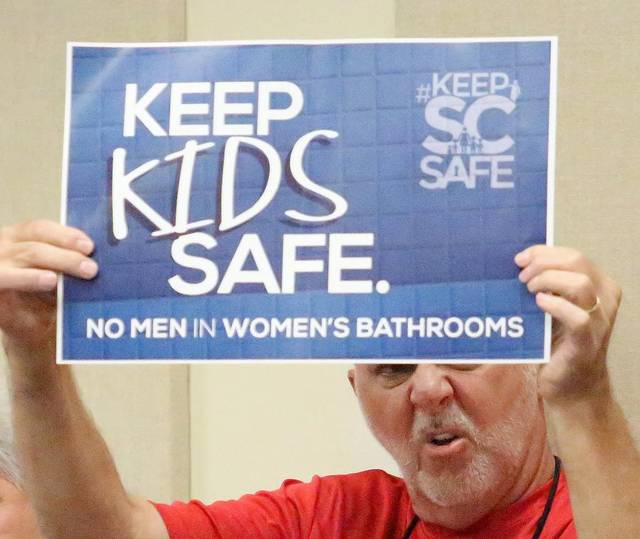
Lawmakers in North Carolina announced late Wednesday night that they had reached an agreement to repeal a measure that restricts which public restrooms transgender people can use.

Lawmakers in North Carolina announced late Wednesday night that they had reached an agreement to repeal a measure that restricts which public restrooms transgender people can use.
The compromise was detailed by the state’s top Republican lawmakers, who have long supported the so-called “bathroom bill,” and endorsed by the state’s Democratic governor, who has been a staunch opponent of that measure.
The controversial and costly law, House Bill 2 (or “H.B. 2”), is largely known for its provisions that require people to use public restrooms that match the sex on their birth certificates rather than their gender identities. But it also had other, more far-reaching provisions, limiting some minimum-wage standards and reversing local ordinances that had expanded protections for LGBT people.
According to the text of a bill aimed at repealing the bathroom measure, lawmakers would also enact a law stating that “no local government in this state may enact or amend an ordinance regulating private employment practices or regulating public accommodations.”
Republican Senate Leader Phil Berger and Republican House Speaker Tim Moore, who released the bill’s text, said the measure would implement until December 2020 “a temporary moratorium” on nondiscrimination ordinances like the one Charlotte passed last year, which precipitated state lawmakers passing the bathroom bill.
“Compromise requires give and take from all sides, and we are pleased this proposal fully protects bathroom safety and privacy,” Berger and Moore said in a joint statement.
In a statement late Wednesday, Democratic Governor Roy Cooper endorsed the deal while noting that it was not a “perfect” agreement.
“I support the House Bill 2 repeal compromise that will be introduced tomorrow,” he said. “It’s not a perfect deal, but it repeals House Bill 2 and begins to repair our reputation.”
State lawmakers have previously flirted with repealing H.B. 2, most notably last December when they held a marathon special session specifically for that purpose. That session was called after Charlotte abandoned its nondiscrimination ordinance, an action that was aimed specifically at clearing the path for state legislators to then scrap H.B. 2.
After a brutal session that saw Republicans feud over whether to fully or partially repeal the bill and had Democrats accusing them of abandoning their pledge to eliminate the measure entirely, the legislators wound up leaving the bill in place.
This week, lawmakers are facing a clear deadline imposed by the NCAA, which gave North Carolina until Thursday to change the law if it wants to host any college sports championships through 2022.
The potential loss of all of those events would add to the already sizable losses North Carolina has faced since enacting the bathroom bill. Companies like PayPal and Deutsche Bank have abandoned expansions in the state, the NBA and the NCAA already have moved games elsewhere, and entertainers have canceled concerts and other shows.
These moves have taken a toll: A new estimate from the Associated Press this week said that over a 12-year period following the law being signed, H.B. 2 would cost the state at least $3.7 billion due to these losses.
It was not clear whether the latest compromise would be able to gather the votes needed to pass. When lawmakers weighed repealing the measure in December, Democrats rejected a version that would have included a six-month moratorium on cities passing nondiscrimination ordinances to protect gay and transgender people.
Reporters in North Carolina noted that Democratic lawmakers appeared angered during the negotiations on Wednesday.
The Human Rights Campaign, which has criticized the bathroom bill, said that the proposed deal “doubles down on discrimination” and called it unacceptable after the details were released. In a statement early Thursday, Chad Griffin, the group’s president, said the agreement proposed by lawmakers “would ensure North Carolina remains the worst state in the nation for LGBTQ people.”
Griffin also vowed that there would be political repercussions for lawmakers backing the agreement.
Pat McCrory, the Republican governor who signed H.B. 2 and was ousted by Cooper last fall, called for lawmakers to “finally stick with this deal.”
North Carolina’s House and Senate are both set to convene Thursday morning.
(c) 2017, The Washington Post · Mark Berman